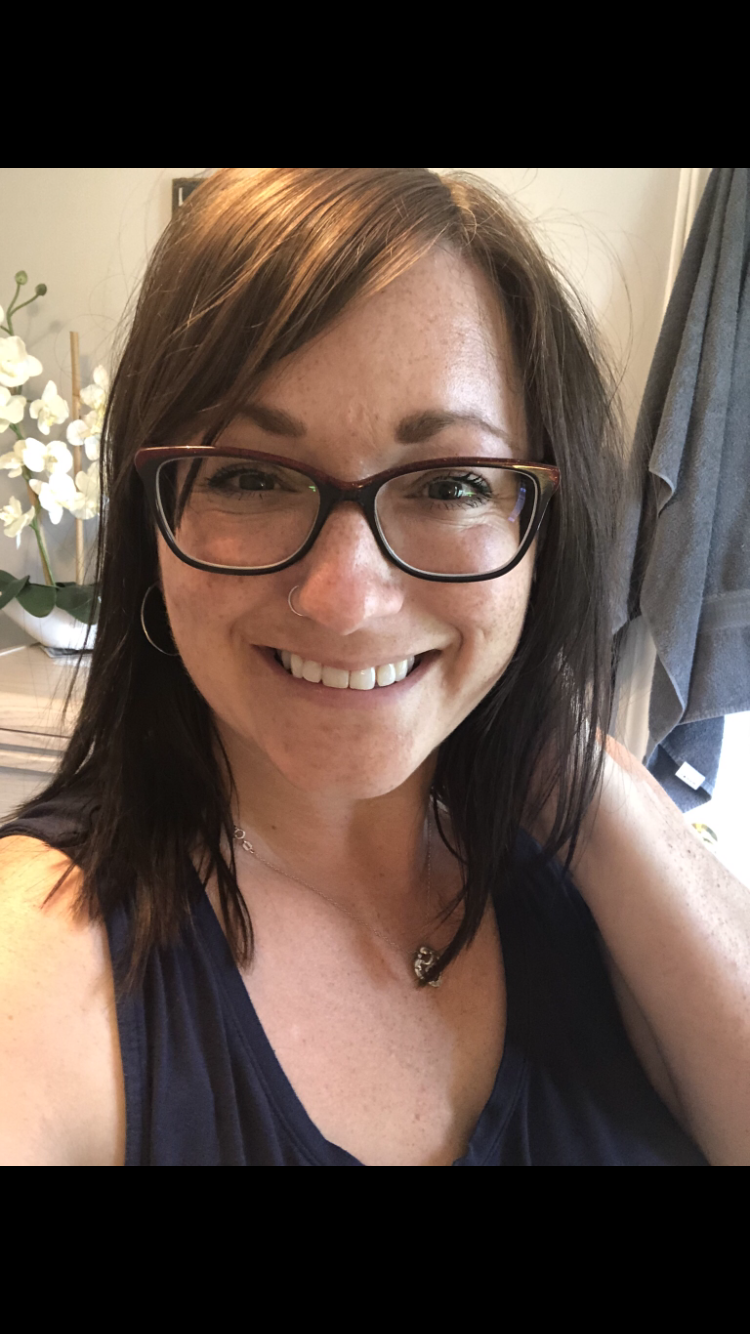Through our interaction with the chronic pain community we continue to meet extraordinary individuals who continue to advocate for themselves. A few weeks ago we met up with Francine, who suffers from PCOS and lower back pain. We just knew we had to share her story. Francine why don’t you introduce yourself.
My name is Francine Charbonneau, I am 41 years young and live in the Ottawa countryside. I grew up in a small Northern Ontario town, loving nature and life’s simplicities. My partner and I are parents to two wild kiddos (a three-year old and a 16 year old), and a very large cat. I work in health care communications for a member association. I’m a passionate mental health advocate and volunteer in animal welfare. I enjoy nature, football, books, pizza, camping, wine, puzzles, karaoke, and warm hugs.
My chronic pain journey is two-fold.
PCOS: In my teens, I suffered from irregular and painful periods, which at times, would affect my daily functioning. I rarely spoke about my period to family and friends, and assumed periods were like that for everyone. I suffered silently for years. It was not until my late 20s when I was referred to a gynecologist that I realized that intense cramping is not okay and having irregular cycles is often an indicator that your body isn’t happy. I was diagnosed with polycystic ovarian syndrome (PCOS), and told to come back when I was ready to conceive.
Chronic lower back pain: My back pain story is a bit of a slow burn. In 2005, I was hit (as a pedestrian) by a car in front of Parliament Hill. The left side of my body took the brunt of the hit, but at the time, I considered myself lucky to “walk away” with only a chipped elbow, a concussion, and deep tissue bruising. I never received physical therapy. Ten years later, I fell down a flight of hardwood stairs – again, on my left side. Aside from more deep tissue bruising and an internal scar, I didn’t think anything more of it. I was in the gym five days a week, probably in the best physical shape of my life, and felt invincible. About seven months later, I started experiencing sharp pain in my lower back and numbness in my left foot. I soon after underwent a surgical discectomy at L5-S1. Although the surgery addressed the structural issue, I was left with spinal stenosis and unexplained chronic pain. The post-operative journey continues…
But through this journey, I am so grateful for my supportive partner, family, friends and workplace. Without them, the fight would be that much harder.
“The irony is not lost on me that PCOS can often contribute to weight gain, and that losing weight is often challenging because of PCOS.”
Can you describe what your pain feels like?
Any pain tied to my PCOS was mostly experienced prior to my diagnosis. I remember having extremely irregular periods, and when I had them, the pain was often unbearable. I remember a former colleague walking into my cubicle one day to find me breathing as if I was going through childbirth contractions (I’ve had a kiddo…It was pretty close!). Once I found the right contraception for my body, the pain diminished greatly. I got an IUD after childbirth, and although I would like to remove it soon, I am worried that my body will default back to those excruciating cramps.
In regards to my chronic back pain, pre-surgery, it was tingling, sharp and debilitating pain. Post-surgery relapse, I would describe the pain as constant, dull, non-specific, and exhausting – yet I’ve come to be familiar with the pain and accept it most days.
Since you do have a few different illnesses that you are working with, how did the progression of diagnosis go for all of these?
With PCOS, things didn’t really come to light for me until I was in my late 20s. There was not a lot of awareness regarding PCOS at that time (late 2000s). Luckily, my family doctor is proactive and when I told him about my irregular periods, unexplained (mid-section) weight gain and pelvic pain, he referred me to a gynecologist who asked the right question and ran the right tests. After that though, he essentially told me to “manage it” and come back when I was ready to conceive. From there, I was on my own with Dr. Google.
The back diagnosis was a long road. I didn’t have a specific injury that led to my pain, which made it frustrating for practitioners. I saw doctors, sports med docs, physiotherapists, chiros, massage therapists. It was only after my leg gave out in the bathtub that I knew I had to advocate for myself. A visit to the ER solved nothing – “Here is some morphine”. A few weeks later during a wild snowstorm a few days before Christmas, I drove myself to my family doctor’s clinic. He was out of town, but his colleague saw me and quickly realized my left ankle reflex was no longer functional. She ordered an emergency MRI that revealed a full disc extrusion at L5-S1. I had discectomy surgery a month later.
Did any of your doctors tell you that you have X because it’s more prevalent in women with Y? Just wondering if there is a clinical link between anything you’re battling.
Oh yes! The stigmatization ran rampant for both diagnoses. With PCOS, the one common thing medical practitioners were focused on was my weight (FYI – at time of diagnosis, I was 5’4 and 150 lbs)! “Well, the one thing that can help in managing PCOS is keeping yourself at a healthy weight.” The irony is not lost on me that PCOS can often contribute to weight gain, and that losing weight is often challenging because of PCOS.
What are some of the more modern medicine techniques that have worked for you?
Managing my back pain was and continues to be a full time job. I’ve tried it all: Pharmaceuticals/pain killers, Lumbar Epidural Steroid Injections, pain clinics, chiropractic care, physiotherapy, etc. Some have worked short-term, but nothing has ever fully and permanently eliminated my pain or addressed the root cause of my pain.
Have you ever reached a point where you had to think outside the modern medicine box? If so, what did you do that helped with the pain?
About a year after my back surgery, the pain came back – but a different pain. A follow up MRI showed spinal stenosis (scar tissue that is common after invasive surgery), but no other structural issues. I had had a terrible painkiller withdrawal episode and no longer wanted to take medication. In desperation, I continued riding the merry-go-round of the usual suspects stated above, but nothing helped. Then for a few years, I gave up. I just accepted the pain as my new normal.
It was only this year (in large part thanks to the pandemic and my rejuvenated focus on self-care) that I really picked myself up and told myself that I didn’t want my pain to define who I was anymore, and that there had to be a different healing path. I accepted that I no longer had a structural issue – I had a pain issue. And although the pain is very real and not in my head, I needed to shift my focus and look internally. The more I understand about my pain, the less I experience pain.
Over the last year, I have read and consumed so much literature on chronic pain in hopes of finding something that resonated with my case. From the late Dr. John Sarno’s tension myositis syndrome (TMS) theory, to the Dr. Stuart McGill Back Mechanic’s method (looking at how the spine works, the mechanisms of pain, and proven ways to eliminate pain and restore pain-free activity), and to the numerous studies on the connection between pain and our Central Nervous System, I’ve recently been able to carve pieces of each approach and apply it in a way that is allowing me to heal myself, with the support of like-minded professionals in the alternative therapies space.
Generally speaking, are you open to alternative therapies such as osteopathic, pelvic floor, myofascial massage, acupuncture?
It is the only approach that has consistently been working for me. For the first time in many years, I feel that I am on a healing path. I am currently working with an osteopath, a pelvic floor physiotherapist, and a physiotherapist (that approaches chronic pain with a holistic/body, mind and spirit lens). All this is done in combination with my own internal work through mindfulness, nature, stretching, visualization, my personal support system, and professional therapy.
Francine thank you so much! What would you tell our readers in order to help them consider alternative therapies?
From a young age, many of us are programmed to trust mainstream medicine. My initial back issue was surgical, but there are so many unnecessary back surgeries performed every day, often out of patients’ desperation and despair. We just want the pain to go away…now.
I do believe there is a place for traditional medicine and pharmaceuticals. Science and many remarkable individuals have helped me throughout my 41 years. However, when it comes to invisible chronic pain, I encourage people (if appropriate to their situation) to take a step back and consider taking a more holistic approach to pain management. In regards to back pain, and even PCOS in this case, there are so many powerful connections between different body and mind systems. Our already overloaded, understaffed traditional medical system is simply not equipped to offer this approach.
Alternative therapies and whole-body/biopsychosocial approaches can often be more successful in identifying and addressing the root cause of pain, as opposed to offering quick and/or temporary fixes. In my experience, alternative therapies also give me a sense of belonging, and that I am more than my diagnoses.
And lastly, what would you tell your younger self about pain management?
Our bodies are complex. Pain is complex. The health system is complex. I would tell my younger self to always trust her intuition, to continuously advocate for herself, and to always remember her worth.
Anything else you want to tell our readers?
No matter how hard it gets, remember that you are so much more than your pain. Do not let it define you.
Don’t ever let anyone (especially a medical professional) dismiss or undermine your experience.
Knowledge is power. Read, ask questions, and find allies. Empower yourself to make the right choices about your condition. No one’s journey is the same.
Believe that you can and will live a fulfilling, productive life.


